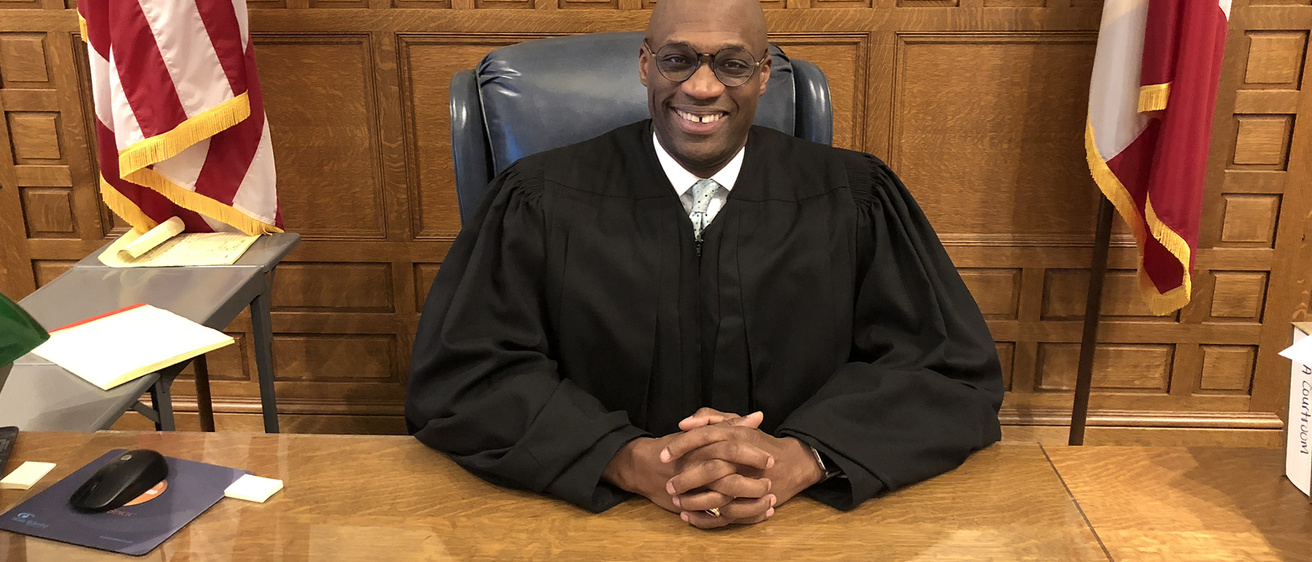As Kevin McKeever enters his third year as a judge in Iowa’s Sixth Judicial District, the University of Iowa College of Law alumnus keeps one philosophy top of mind.
“I think when you serve the people, you should always aspire to be great,” says McKeever. “You need to be trying to improve, and you need to pass lessons on to the people who will eventually take your place, with the goal that they will do the job even better than you did.”
After graduating from the UI College of Law in 2001, McKeever began his legal career as an assistant attorney in Ramsey County, Minnesota.
“I really enjoyed that, and I feel I grew a lot in my first years in the profession,” he says. “They were very good at what they did, and they taught new hires the tricks of the trade—we talked about case law, integrity, and the fact that getting a just result is more important than winning a case.”
McKeever then worked as a staff attorney at the testing company ACT Inc. for three years—where he gained valuable perspective on what it was like to work in corporate law—before joining the Muscatine County Attorney’s Office in 2011.
“It was a small office, so everyone did everything. We all pitched in where we were needed, and that was really good experience for me because I hadn’t seen the protection side of juvenile law,” says McKeever. “It was interesting because in my career I have had the chance to see a big office, a small office, and the corporate side at ACT—I had a chance to see every side of things.”
After nearly 14 years of varied practice, McKeever was sworn in as a judge in Iowa’s Sixth Judicial District—which includes Linn, Jones, Benton, Iowa, Tama, and Johnson counties—in October 2015. And, though he says it took some time getting used to his new role, it’s been a smooth transition.
“I have to make some hard decisions, but overall I’ve really enjoyed the experience,” McKeever says. “I think, in some ways, being a lawyer is harder (than being a judge), because as a judge, you have to know the rules, but you don’t have to be as concerned for the strategy of how to win. Your concern is that citizens can come into the courtroom and have their disputes settled in a fair and peaceful manner that’s equitable to both sides.”
Throughout his career, McKeever says he often reflects on his memories from the College of Law—including an important reminder about why he entered the profession in the first place.
“During the first week of orientation, one of my professors said we were joining an honorable profession. That piqued my interest, because I have always considered honesty and integrity to be very important qualities to have,” McKeever says. “I often think about how those moments and classes really helped to shape my ideas about the law, what it means to our society, and how important it is to have a judicial system that works for the people.”
He encourages current students to not settle for the first job offer but, rather, to find something they enjoy that will allow them to continue to learn.
“You need to like the job just as much as the job likes you because you’re going to spend a lot of time doing it. It should be something you believe in and something you can really get behind,” McKeever says. “When I went into prosecution, it wasn’t just a job to me. I believed that through that job I could benefit the community, and it was something I wanted to do. I wanted to help other people. I was motivated by the mission itself. I think that’s something that’s easily overlooked.”
